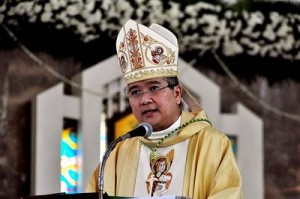Poverty a ‘social scandal’–CBCP

Catholic Bishops Conference of the Philippines president Archbishop Socrates Villegas: Corruption in government continues to hurt the people. (cbcpforlife.com photo)
MANILA, Philippines—The leaders of the Catholic clergy on Tuesday issued a strong statement against the growing poverty in the country, calling it “a social scandal” that involved not just government but also people’s attitudes.
“This is a social scandal for which we cannot just blame government. We need to understand our role in it, our personal responsibility for it in our individual lives and shared cultures, and return to Jesus,” the Catholic Bishops Conference of the Philippines (CBCP) said in a pastoral exhortation signed by its president, Lingayen-Dagupan Archbishop Socrates Villegas.
The pastoral letter was issued after the conclusion of the biannual plenary assembly of the CBCP from Jan. 25 to 27 called for a renewed commitment to “liberate the people from injustice and oppression.”
The bishops’ collegial body composed of 120 bishops from all over the country said that although there have been advances in some areas such as basic education and fundamental aspects of the economy, “all the shameful slime uncovered in connection with the Priority Development Assistance Fund” are those that made the life of the Filipinos more difficult.
“We cannot help but admit with Pope Francis that 28 percent of our people ‘are barely living from day to day,’” the CBCP said.
Article continues after this advertisementMore sensitive
Article continues after this advertisementBut the Catholic faithful must not just blame the government, the Catholic prelates said, as they exhorted them to be more sensitive to the plight of the poor and to shun the tempting allure of material wealth and riches.
When asked to expound on the matter in an interview with reporters, Villegas said the corruption in government continued to hurt the people.
He said he was “scandalized” by the fact that there were people scouring wastes of fast-food chains so they could have food in their table while the rich just throw away what they have.
“A man would keep leftovers from the garbage pit, heat them, put some soy sauce, and then offer these to his children. And then you see on the other side of the city, people living in affluence, in luxury, practically throwing away money. How can you not be hurt by that,” Villegas said.
The archbishop said what the country needs is a change of attitude.
In the CBCP pastoral letter, the bishops called on the faithful to fight the “economy of exclusion”—one that gives prime importance to wealthy and influential individuals while neglecting the plight of less fortunate members of the state.
The bishops said decision-making in the government was concentrated “in an entrenched elite,” reducing participation of the poor in these decisions to empty formalities.”
Corruption scandals
The statement of the CBCP came amid multibillion-peso corruption scandals linked to government officials, senators and representatives and executives of nongovernment organizations.
The bishops also said “indigenous peoples are pushed off their lands and their defenders are killed.”
It said government laws that would close the gap “between included and the excluded, the wealthy and the poor, the powerful and the disempowered, the housed and the homeless are sluggishly implemented or implemented in the breach.”
The Catholic bishops blamed the “greed for money” as the main culprit behind the social problems faced by the country.
While the Church recognized the need for physical riches to fulfill an individual’s personal and familial needs, it noted that “private property was encumbered by a ‘social mortgage’ and must contribute to the common good.”
The bishops noted that the one task of the Church was to liberate the people from injustice and oppression.
“There is no Christianity without love. There is no love without justice. There is no integral proclamation of Christianity without effective action for justice. The Church’s mission of redemption is tied up with liberation from injustice and oppression,” they said.
Villegas urged bishops to be more contemplative in their actions toward the poor.
“If contemplation does not lead to action for justice and charity, it might have really become the ‘shabu’ of the bishops, an addictive flight from reality,” Villegas said.